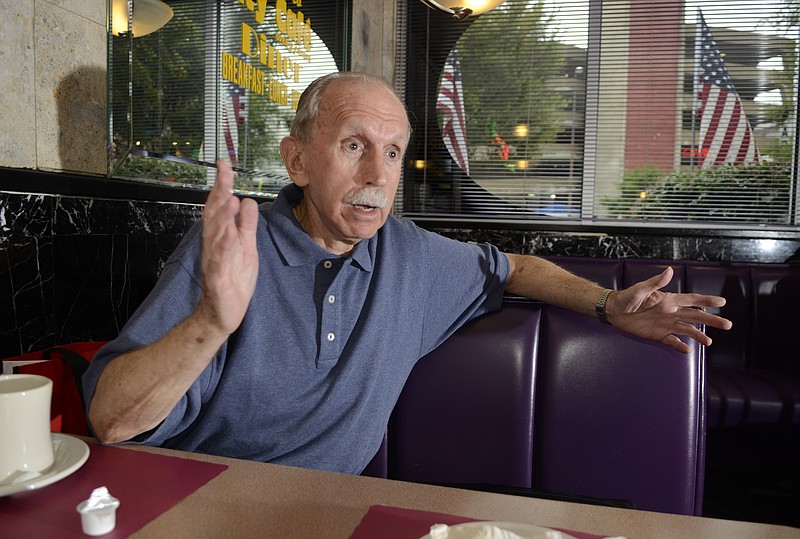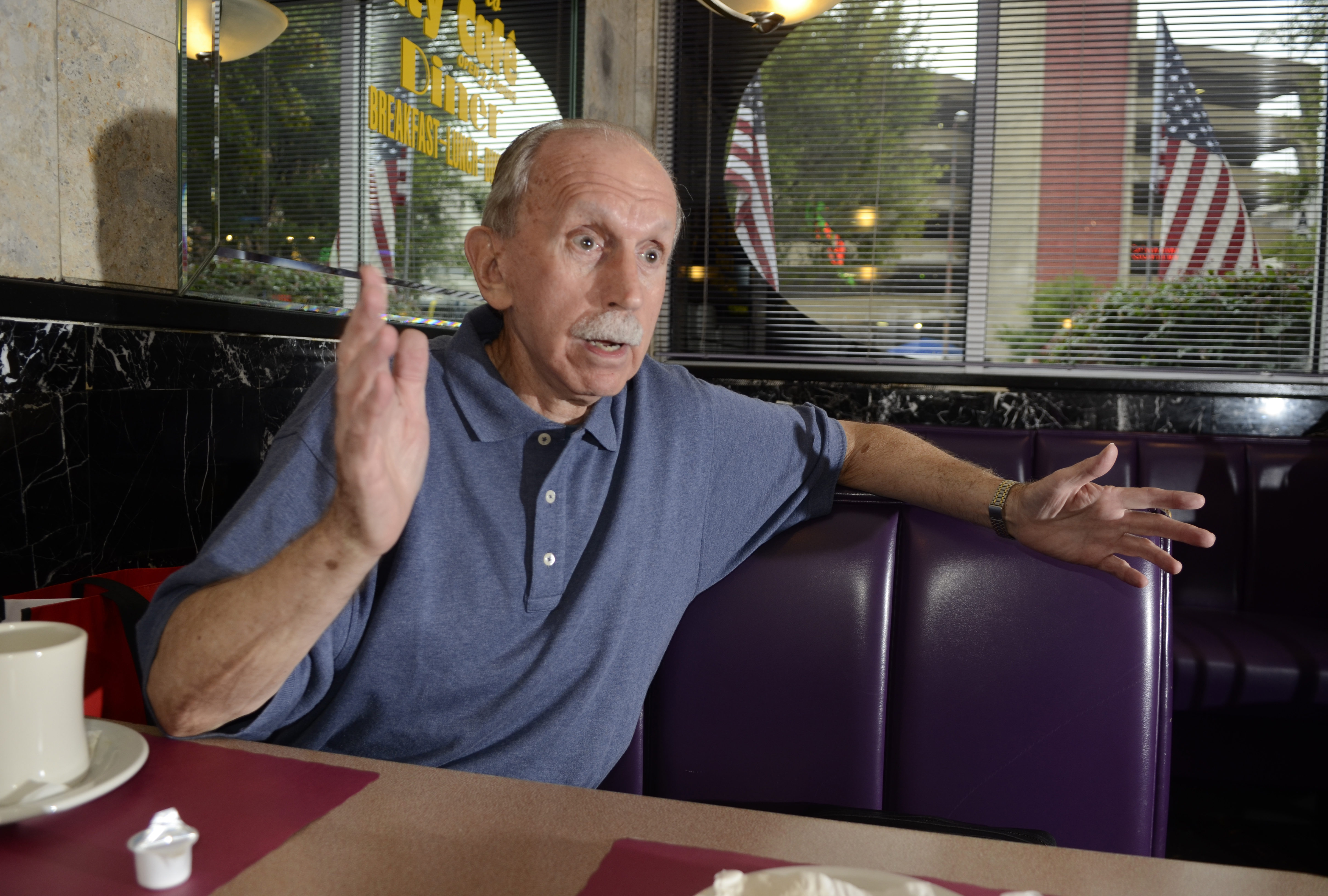Dennis Graham remembers Sept. 11, 2001, as a crisp, clear day. It was so lovely, in fact, that when he left his downtown Manhattan apartment before 6 a.m., he kept his windows open.
He joined a neighbor to vote in the mayoral primaries, then headed to work at Immigration and Naturalization Services, three blocks from the World Trade Center.
His shift, conducting green-card interviews, began at 6:30 a.m. More than 500 immigrants, some with babies, waited seeking naturalization.
It was just another day. Until it wasn't.
***
That same morning, in Flatbush, Brooklyn, Bea Lurie dropped her daughter off at first grade on her way to the bank.
"I started hearing fire engines," she said.
At first, she thought nothing of it and continued on her way. But then she heard another emergency vehicle, and another, and more still.
"The volume was just unbelievable."
Upon arriving at the bank, Lurie was told there had been an accident -- a plane had hit the World Trade Center.
"I said, 'That's not an accident,'" she recalled. "There's no way a plane just unintentionally hit the Trade Center. I knew it was a terrorist attack."
Stunned, she completed her transaction and sat in her car listening to the radio.
At 9:03 a.m., the second plane hit.
***
Minutes earlier, Graham said, a colleague had entered his office and told him a plane had hit the World Trade Center.
"And then the second plane hit," he said, "and my entire building, which was 58 stories, shook."
Soon, smoke started spewing up from a couple of blocks south. Ten minutes later, Graham's building evacuated.
He wanted to return to work. But the building was closing for the day.
So Graham started walking.
And then came the noise.
"Jesus," he said. "It was like a huge train suddenly going by. I looked up, and I saw the first tower start to shake and crumble."
So he went home, and he closed the windows. He turned on the television. He watched the horror. He saw the smoke. He saw the jumpers.
After a while, he walked to St. Vincent's Hospital to donate blood. Eventually, he and other people waiting to donate were sent home. There were no more survivors, they were told.
***
Lurie called her daughter's school and was told the children weren't being informed about the tragedy and that they were safer at school. But her daughter's teacher panicked and turned on a radio, breaking school code. That's how a roomful of first-graders, some of whom had parents who worked in the Trade Center, found out about the terrorist attacks.
"It got pretty scary very quickly," Lurie said. She went to get her children, her daughter and her son, then in sixth grade, and saw heavily armed police officers holding assault rifles and shields. Helicopters buzzed overhead.
***
In Chattanooga, New York native Rachel Schulson heard the news from a colleague.
"She was the kind of person who often panicked needlessly," Schulson said of her associate, so despite having in-laws, aunts, uncles and other extended family members living in Manhattan, Schulson said she didn't worry too much.
In fact, she said, she assumed it was a private plane, an errant pilot. The severity of the day took a long time to sink in.
"When somebody at work brought it up on the Internet and when I saw the first building go down, it really hit me. I just couldn't believe any airplane could bring a building down. And a building like that. I still can't believe it. ... Every once in a while I'll just think -- there's no World Trade Center. When I go to New York now and I see that space ... it still amazes me. It's so weird."
***
Sept. 12, 2001, Graham said, "was like a foggy day in London Town when I was walking through the streets. There was nobody -- just me and this horrible stench."
He described the smell as a combination of rotting garbage, human debris, metal and electronics. It was awful, he said.
"When the wind hit in a certain way, you could smell the burning flesh," Lurie said. "It was horrible. I imagined it was like the concentration camps. It's an acrid smell."
Her husband, David Eichenthal, was chief of staff for public advocate Mark Green and was on-site two days after the planes hit. When he came home that night, he threw away the suit he'd been wearing.
***
In the days that followed, the stories were told, losses counted -- a father who would have been inside had he not run home to collect his son's forgotten homework, a teacher who along with her students saw the first plane hit from the window of her classroom.
Graham knew only one person who perished that day, Father Mychal Judge, later called the Saint of 9/11.
***
Schulson once worked in the World Trade Center, on the 79th floor of the North Tower, and wonders about the people she knew there.
She was the only representative from her company in the building, she said, but was acquainted with other workers.
"I do very much wonder about the people," she said. "I have no idea what happened to those people because I never kept up with them. I don't even know what the names of their companies were so I couldn't look them up. I often think of that."
Part of her, she admitted, doesn't want to know.
***
For three weeks after the towers fell, Graham worked with emergency services, doing what he could. Streets were blocked. Lower Manhattan was closed off.
"I needed a passport to get across Canal Street to go home," he said. "I always carry my passport. You never know."
His office remained closed for 30 days.
In the midst of it all, Lurie said, she wanted to find a way to help her children process what had happened in a positive way, by helping them to make a difference. Together, they created get-well cards for 9/11 victims.
Afterward, Graham said, New York was different.
"There was an incredible atmosphere of cooperation and respect," he said. "People just pulled together. 'What can we do?' 'Do you need anything?' "
He'd never seen that before, not there.
"I like to say, 'I loved New York because I never knew if I was going to live until dinnertime.' But you get used to that atmosphere, and it becomes normal. But after 9/11, everybody became slower and kinder."
But in Lurie's neighborhood, there was a threat of unrest.
Word spread that residents of a heavily Muslim area six blocks away were celebrating in the streets.
"I never verified it personally, but that's what people were saying," Lurie said.
A bullet was shot through the window of a church attended by a Muslim friend.
She was afraid to venture into certain areas.
"I became really worried for our community," she said. "Things were getting ugly pretty quickly. ... It didn't stop after 9/11."
Like the day she got a call from one of her husband's co-workers asking: "Where's David? They evacuated Grand Central Station. There was a bomb threat."
Lurie organized a Unity Day, contacting different religious groups and organizations. More than 1,000 people met at a public school with candles, speakers and songs. Prayers, from all different religions, were offered.
***
Schulson remembers her first visit back to New York, only a few weeks after 9/11.
"There was dust all over the cars still," she said. "There were signs everywhere [asking] "have you seen this person? ... It was much more real when we went. The mood was different; There were flags everywhere. It was definitely a different city."
On another visit a year later, she visited lower Manhattan and got lost because she had always navigated by the World Trade Center.
"I never go down there now," she said. "I just can't. It's too weird."
***
For a year, the trucks came in and out, collecting debris. The smell hung in the air. The helicopters kept buzzing.
"People don't realize how long it was going on," Lurie said. "Six months later, things were not back to normal yet."
Debris, burned pieces of paper and wreckage from the towers, found its way from Manhattan to Brooklyn nearly 7 miles away.
"It wasn't like you could bury it," she said, "because you look out the window and the buildings weren't there. ... Every time 9/11 comes around, or you see those numbers on a clock or that date, it just takes you back to a time that was just horrible."
***
Graham is no stranger to national tragedy. He's lived through three major 'where were you when' incidences: Born in 1941 in Honolulu, he and his mother boarded a ship to Los Angeles on Dec. 6, one day before Pearl Harbor was attacked. He was a U.S. Navy officer, stationed in Newport, R.I., the day President John F. Kennedy was assassinated. And then there was 9/11.
The noise, he said, stands out to him the most.
But he wasn't afraid, he says.
"At no point was I scared. It didn't occur to me. Disbelief, yes. But I did not experience fear at all."

